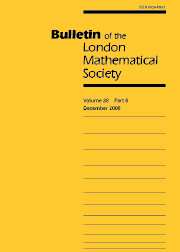Article contents
A SHORT PROOF OF SCHOENBERG'S CONJECTURE ON POSITIVE DEFINITE FUNCTIONS
Published online by Cambridge University Press: 01 November 1999
Abstract
In 1938, I. J. Schoenberg asked for which positive numbers p is the function exp(−∥x∥p) positive definite, where the norm is taken from one of the spaces [lscr ]np, q>2. The solution of the problem was completed in 1991, by showing that for every p∈(0, 2], the function exp(−∥x∥p) is not positive definite for the [lscr ]nq norms with q>2 and n[ges ]3. We prove a similar result for a more general class of norms, which contains some Orlicz spaces and q-sums, and, in particular, present a simple proof of the answer to Schoenberg's original question. Some consequences concerning isometric embeddings in Lp spaces for 0<p[les ]2 are also discussed.
- Type
- NOTES AND PAPERS
- Information
- Copyright
- © The London Mathematical Society 1999
- 9
- Cited by


